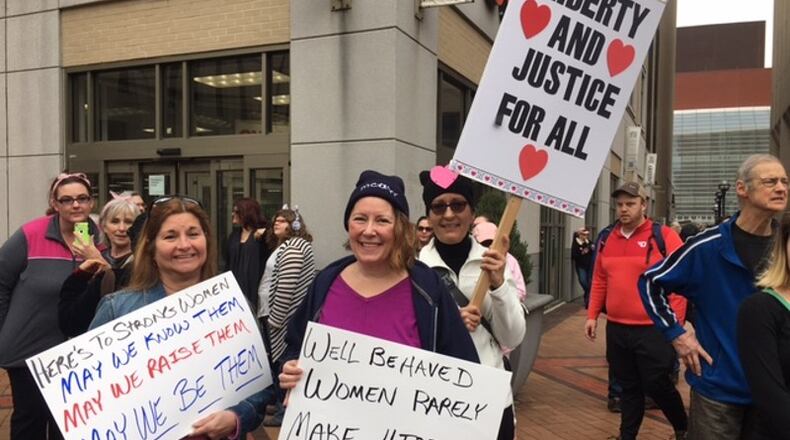But what does it mean for Ohio?
“The more light we can shine on these issues — on sexual harassment and all other discrimination charges — the better we are as a community,” said Mary Turocy, director of public affairs and civic engagement with the Ohio Civil Rights Commission. “Often the perpetrators take advantage of the silence around these issues.”
RELATED: Here’s what to do if you are sexually harassed at work
The Ohio Civil Rights Commission last year saw an increase in sexual harassment charges filed against people across the state, according to data obtained by this newspaper. Harassment charges declined in this part of southwest Ohio, but experts noted the numbers fluctuate from year to year.
Other observers question whether sexual harassment being in the national spotlight will embolden more victims — especially those without stardom or major platforms — to come forward to report misconduct or pursue legal action against alleged perpetrators.
Sandra Sperino, a law professor and associate dean of faculty with the University of Cincinnati College of Law, thinks the national conversation will cause more people to consider pursuing a discrimination claim.
Studies have shown that few people who experience sexual harassment file an internal complaint with their employer, she said.
Even fewer people start more formal processes, like complaining to an administrative agency or going to court, said Sperino, who lives in Kettering.
Also, the courts repeatedly have said that one of the primary goals of anti-discrimination laws is to get employers to solve the problems without litigation, Sperino said.
RELATED: Survey shows 1 in 3 men don’t think catcalling is sexual harassment
Two ways to file
Sexual discrimination is illegal in the workplace, and that includes sexual harassment, such as unwelcome sexual advances or requests for sexual favors, according to the U.S. Equal Employment Opportunity Commission (EEOC).
Unlawful harassment affects a person’s employment, unreasonably interferes with their work performance or creates an intimidating, hostile or offensive work environment, the commission said.
People who want to file a federal charge of sex discrimination against their employer must file a complaint with the EEOC.
The EEOC received 158 complaints of sexual harassment from Ohio in fiscal year 2016, according to the agency’s most recent data.
But Ohioans and others who were sexually harassed in the state also can choose to file charges with the Ohio Civil Rights Commission, which enforces the state’s anti-discrimination laws.
Last year, the commission received 165 charges of sexual harassment through the middle of December, which was up 25 percent from 2016, commission data show.
Sex harassment charges against people from this region actually declined, falling to 15 from 27 in 2016, the data through mid-December show.
Charges stemming from complaints from women and men were filed against people in Butler, Clark, Greene, Miami, Montgomery and Warren counties.
MORE: Number of sex assaults reported at Wright-Patt increases
See something, say something
Most employers take sexual harassment seriously and understand that they can be liable if they do not take steps to prevent and stop harassment in the workplace through mandatory training, education and clear policies forbidding discrimination, some experts say.
The civil rights commission encourages everyone who thinks they have been sexually harassed to report the incidents to their employer, the commission or the EEOC.
“We can’t do anything about harassment if we don’t know it’s happening,” said Turocy, a commission spokeswoman.
RELATED: As #MeToo gains traction, more in power stand accused
Across the country, sexual harassment occurs at a higher rate in industries with large numbers of low-wage jobs predominantly held by women, according to an analysis of EEOC data by the left-leaning Center for American Progress.
Workers who live paycheck to paycheck or face other daunting economic realities may be reluctant to come forward with a discrimination complaint for fear of retribution, experts say.
Nearly three-fourths of sexual harassment charges filed with the EEOC include an allegation of retaliation either upon being filed or later on in an investigation, suggesting that many victims face retribution when they speak out, the center said.
The largest number of sex harassment claims came from workers in the accommodation and food services industry, followed by retail trade, manufacturing, and health care, the analysis said.
“The more we understand that the pervasiveness of sexual harassment is not unique to elite circles, we can begin to identify and deploy effective strategies to combat discriminatory practices where they are most needed,” Jocelyn Frye, senior fellow at the Center for American Progress, said in a statement.
e.
About the Author

